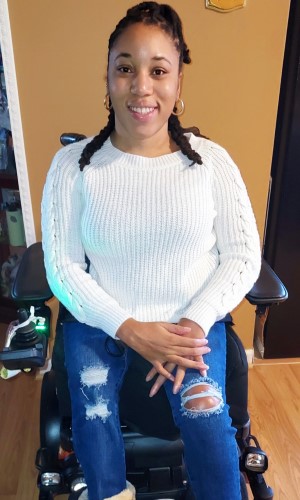Social Security makes every effort to ensure that any information published is accurate and up to date, but some information on this webpage may be historical.
Jessica's Success Story
Published in 2023
Earnings & Empowerment: Jessica's Story
Born with cerebral palsy, Jessica felt stigmatized her whole life. After getting her Masters, she was eager to enter the workforce. Social Security's Ticket to Work Program and other Work Incentives helped her gain her financial independence.
 "But this is school! What do you mean I can't have a book?" asked 4-year-old Jessica. Her teacher responded by telling her that reading was not on the day's agenda in the special education classroom.
"But this is school! What do you mean I can't have a book?" asked 4-year-old Jessica. Her teacher responded by telling her that reading was not on the day's agenda in the special education classroom.
Jessica reflects on this painful memory with an appreciation for how far special education has progressed since her primary school years. It showed Jessica the impact a teacher can have on a vulnerable student. On behalf of that deflated little girl in the wheelchair, adult Jessica points out, "There are few things more pitiful than giving up on a 4-year-old."
In 1994, Jessica was an enthusiastic learner with an early love of books and a body that cerebral palsy (CP) made uncooperative. Jessica had been excited about starting school and making new friends. But her first day was a bitter disappointment.
While other classes teemed with rambunctious children, the special ed room was subdued. Jessica couldn't articulate what was wrong but knew she was bored. She wasted no time telling her mother she didn't want to go back. When Jessica's mom saw the setting for herself, she advocated successfully for Jessica to join a different class. She knew Jessica needed a learning environment that would embrace her interests and strengths.
Jessica's parents taught her to speak up, even when feeling intimidated, and to not give up on something important because of an obstacle. Special ed students were often marginalized before the 1990 Individuals with Disabilities Education Act (IDEA), which guarantees equal access to free and appropriate public education. Today, children with disabilities have a right to be included in regular classes with a mix of peers and an Individualized Education Plan (IEP) that incorporates support services, designed with parental approval.
From stigma to stamina
Harmful assumptions about Jessica's capacity for achievement followed her throughout elementary and secondary school. "My good grades and good behavior were not enough for promotion," she recalls. "Because I have cerebral palsy, I had to demonstrate, through additional assessments, that I met what felt like arbitrary mental and physical criteria before I could move on [to higher grade levels] with the rest of my class."
These struggles helped Jessica build a spirit of perseverance. She learned to step outside her comfort zone and advocate for herself. Today, she is not easily discouraged.
She credits family, guidance counselors, teachers and friends who encouraged her to build on her strengths and helped to ensure she didn't grow up defined by a disability. "My friends were a big influence and inspiration," she recalls. "They told me I'm a good listener, …and that I show up for people. It got me interested in studying psychology and helping other young people build resilience."
Jessica completed high school with advanced placement credits and the self-advocacy skills she needed to get through the transition to college. Several accessibility issues presented new challenges, and Jessica worked with the university to pull together multiple accommodations required for a successful on-campus college experience. It took time and tenacity, but she went on to earn a BA in psychology and then continued to graduate school, earning a Master of Arts in Clinical Mental Health Counseling.
Ticket to Work
 Jessica left graduate school with credentials and empowerment. While grateful for her Supplemental Security Income (SSI), she was eager to enter the workforce and earn enough money so she would no longer have to rely on a small, fixed income.
Jessica left graduate school with credentials and empowerment. While grateful for her Supplemental Security Income (SSI), she was eager to enter the workforce and earn enough money so she would no longer have to rely on a small, fixed income.
"I have student loans to pay," she said. "I wasn't going to sit on a degree."
Jessica knew she needed guidance as she prepared for a career. So, when information arrived in the mail about Social Security's Ticket to Work (Ticket) Program, she gave them a call.
Jessica discovered she was eligible to receive free employment support services such as career counseling and help finding a job. Through the Ticket Program, State Vocational Rehabilitation (VR) agencies and service providers known as Employment Networks (EN) help recipients of Social Security disability benefits (ages 18 through 64) prepare for, find, or maintain employment. The program is free and voluntary and was established to help people progress toward financial independence through work.
Jessica connected with The Choice Group, a Virginia-based EN that would help her plan a career, learn about the impact of earnings from work on her disability benefits, and navigate a job hunt.
"[The Choice Group] helped me shape an emerging interest into a focused career goal," she says. They paired Jessica's listening skills, advocacy experience, and her ability to identify people's strengths with the growing needs of an underserved population. Jessica and her career counselor created an Individual Work Plan (IWP), a roadmap to help her articulate and reach employment goals in the field of mental health counseling.
Work Incentives promote confidence
Without Medicaid-funded healthcare and support, Jessica could not work. So, she had to consider the impact earning a paycheck would have on the benefits she relied on. She needed Benefits Counseling, a free service offered by some Ticket Program providers to explain how working affects federal and state benefits.
The Choice Group's Benefits Counselor educated Jessica about Social Security rules known as Work Incentives. Work Incentives make it easier for adults with disabilities to gain work experience while continuing to receive Medicaid or Medicare and in some cases, SSI or Social Security Disability Insurance (SSDI) benefits. Jessica learned that after she was employed, her Medicaid coverage could continue, even if her earnings from work became too high for an SSI payment. This Work Incentive, called Medicaid While Working (or 1619b), allowed Jessica to focus on pursuing employment without worrying about the sudden loss of benefits. In addition, many states have a Medicaid Buy-In Program that allows a worker with a disability to buy Medicaid at affordable rates if they are no longer eligible for free Medicaid because they earn too much money.
There are many different Work Incentives available to help people see if working is right for them. As everyone's circumstances are different, job seekers are encouraged to consult a Benefits Counselor at the outset of exploring employment.
"Learning about these [Work Incentives] was so helpful," Jessica reflected. "Entering the workforce with fewer unknowns improved my confidence... that I could have the support I needed, pay my bills, and work in my chosen field."
Finding a home at work while working from home
With help, Jessica updated her resume and LinkedIn profile, decided how to go about asking for reasonable accommodations, and practiced interviews. "The Choice Group gave me the guidance and encouragement I needed. They suggested questions I hadn't thought of, helped me follow up with employers and gather feedback," she recalls. "They saw something in me… I felt valued."
In 2020, Jessica landed a position at Virginia Counseling Associates where she works with clients of all ages, addressing the symptoms of mental illness. Jessica does one-on-one sessions, develops treatment plans, and facilitates therapy groups, while completing her certification as a Licensed Professional Counselor. She works from home most of the time doing telehealth sessions.
Jessica points out that as an adult, she continues to manage "… triple stigma, as a woman of color living with cerebral palsy." Knowing what it is like to negotiate adolescence with a disability has given her a unique vantage point. "Young people especially need mentors who have had similar experiences and know what it's like to hope, hurt, or fear in similar circumstances. They need support from people who do not see them or their potential through that distorted lens that zooms in on a disability."
Jessica's mentors inspired her to appreciate the importance of cultivating a strong sense of identity early on, and she is intent on paying it forward. "This work allows me to do what I'm passionate about," she continues. "It gives me a purpose. As a person with a disability who also struggles and enjoys life, I want to help others see their own value and the strengths that will enable them to live their best life."
At a time when there is a growing need for mental health support, Jessica says being part of the solution brings her great satisfaction. Since trading in her SSI for a paycheck, her perspective has opened. "Ticket to Work has made it possible for me to see a future with more support and less debt," she says. "I have options that were out of reach when I was relying on SSI, and it is liberating!"
With the right support, Jessica found her path to a better future. Find yours.
To learn more, call the Ticket to Work Help Line at 1-866-968-7842 or 1-866-833-2967 (TTY), Monday through Friday, 8 a.m.- 8 p.m.; or visit https://choosework.ssa.gov.